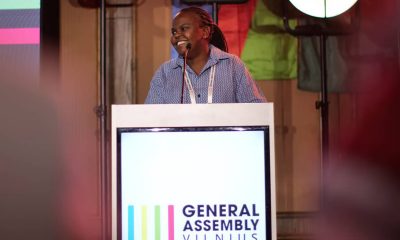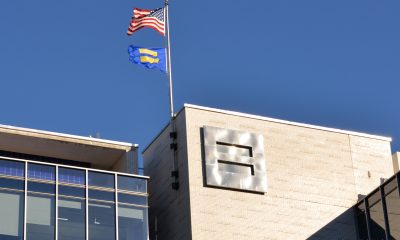Africa
Namibian High Court strikes down Apartheid-era sodomy laws
Gay activist challenged statutes in 2020
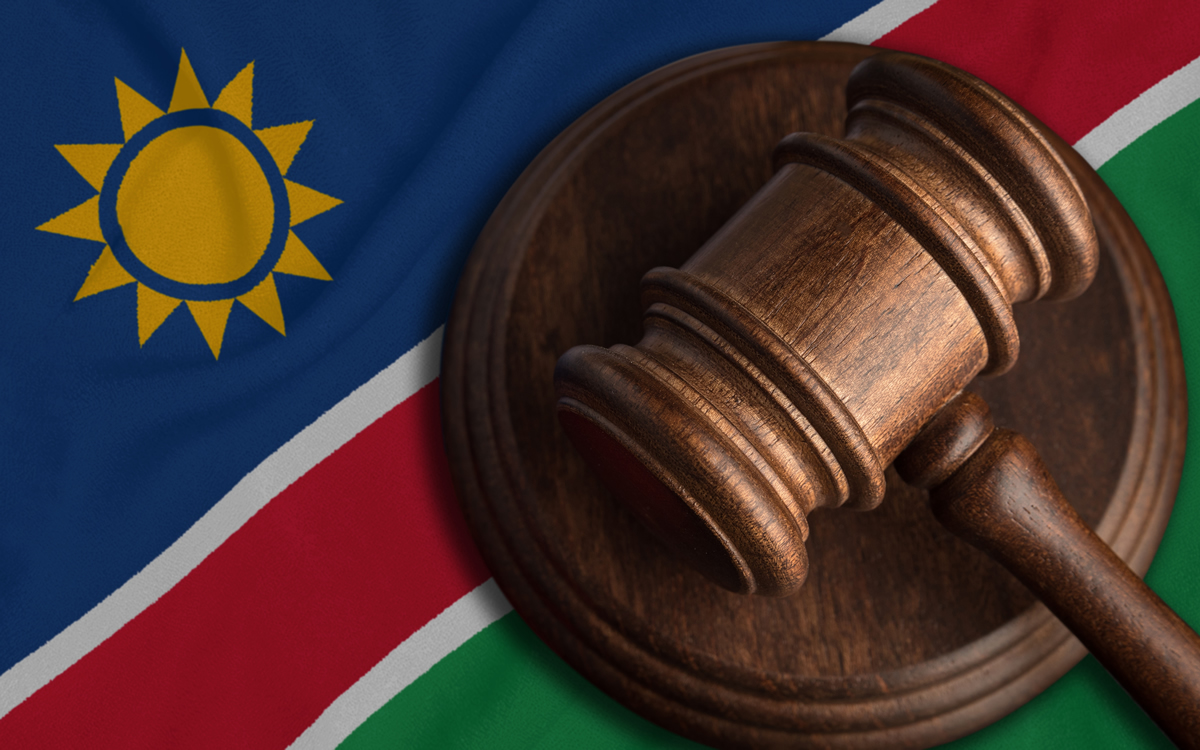
The Namibian High Court on Friday ruled laws that criminalize consensual same-sex sexual relations in the country are unconstitutional.
Friedel Dausab, a gay activist, in 2020 challenged the Apartheid-era statute.
The Washington Blade previously reported Dausab said the Criminal Procedure Act 51 of 1977, which listed “sodomy” as a Schedule 1 offense, and a second law that criminalized “unnatural” sexual acts, promote stigma and exclusion of LGBTQ Namibians. Equal Namibia, a Namibian LGBTQ advocacy group, on its X account praised the ruling.
“Welcome to a new Namibia. A born-free Namibia,” it said.
🚨BREAKING🚨: The High Court of Namibia has declared the apartheid-era Sodomy Law unconstitutional and should be repealed.
Welcome to a new Namibia. A born-free Namibia. #TogetherWeCan pic.twitter.com/asOoMbCPwq
— Equal Namibia (@EqualNamibia) June 21, 2024
Dausab, who challenged the laws with the assistance of Human Dignity Trust, a British NGO, told Reuters he is “just happy.”
“It’s a great day for Namibia,” he said. “It won’t be a crime to love anymore.”
Namibia is the latest country in which consensual same-sex sexual relations have been decriminalized in recent years.
The Namibian Supreme Court in May 2023 ruled the country must recognize same-sex marriages legally performed elsewhere. The landmark decision sparked criticism among leading politicians and religious officials.
Activists say their rhetoric has contributed to increased harassment of LGBTQ Namibians and hate speech against them.
Amnesty International in a press release notes MPs last June passed two bills that “seek to define marriage as a union between a man and a woman, discriminate against trans people and criminalize any support, celebration or promotion of same-sex unions with up to six years in jail and hefty fines.” Khanyo Farise, the group’s deputy regional director for East and Southern Africa, said the organization in recent weeks has “observed alarming rhetoric threatening LGBTI persons in Namibia.”
“Whatever the outcome of the High Court decision on June 21, violence and discrimination against LGBTI people has no place in Namibian society,” said Farise. “Authorities should take decisive action to prevent human rights violations against LGBTI persons and hold perpetrators accountable.”
Africa
Congolese justice minister orders prosecutor general to arrest LGBTQ allies
Constant Mutamba issued directive on June 15, implementation unclear
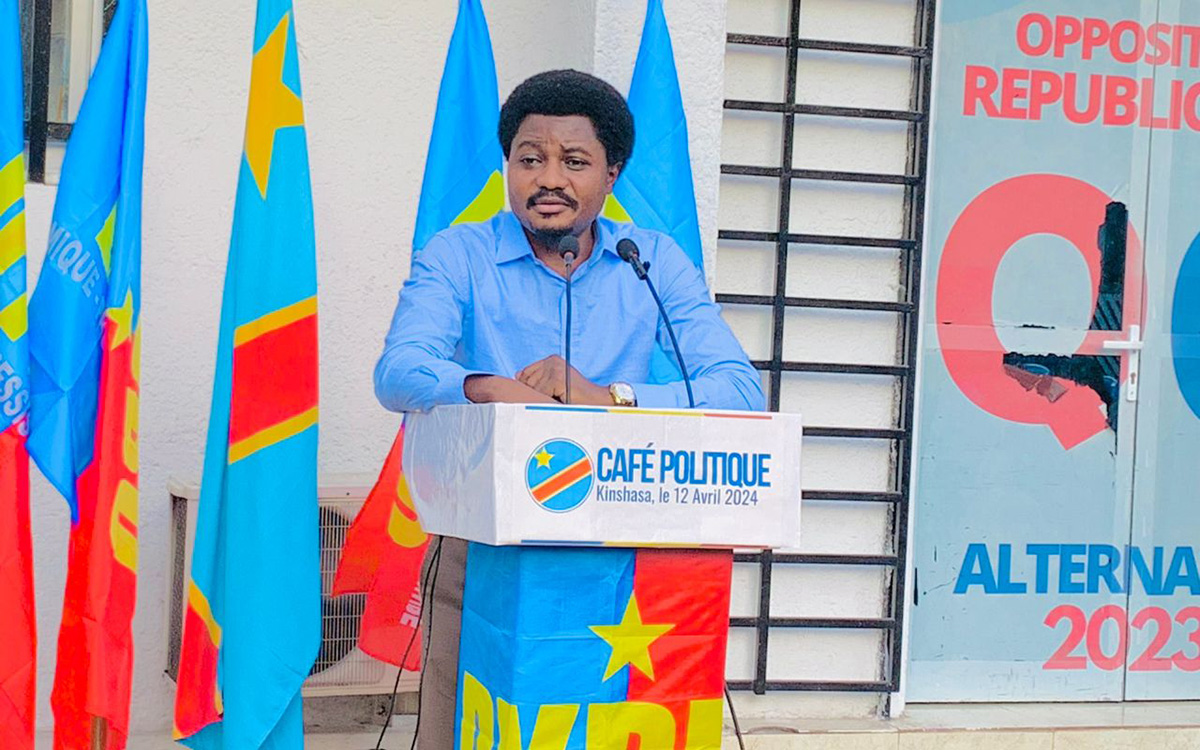
Congolese Justice Minister Constant Mutamba has instructed his country’s prosecutor general to arrest LGBTQ allies.
The newly appointed justice minister in a June 15 communique said the prosecutor general should initiate legal proceedings against people who advocate for the LGBTQ community in Congo.
Although same-sex marriages are constitutionally prohibited, there is currently no law that criminalizes consensual same-sex sexual relations. The communique has raised a lot of eyebrows from social and LGBTQ activists who are asking on what grounds Mutamba issued the communique.
“He could have started by initiating a bill in this direction, but in the current Congolese legislation he is missing the point,” said Jean Claude Katende, a Congolese human rights activist who is the president of the African Association of Human Rights. “If he wants to repress homosexuals, he must initiate a law which must make this behavior an offense and have it punished. He will be arrested for complicity in arbitrary arrests. The constitution is clear, no one can be prosecuted for an act which does not constitute an offense.”
Khelver Hermano, a Congolese social commentator, said the law should not be interpreted based on one person’s emotions.
“LGBT marriage is already not applied in the DRC but the minister wants to incarcerate those who do it informally without a legal basis,” said Hermano. “The law is not interpreted according to our will.”
“Does the penal code in the DRC recognize polygamy? Why don’t we arrest all these known polygamists?” asked Hermano. “Just as polygamists are not prosecuted, we cannot do so against LGBT people.”
Many Congolese people, however, have welcomed the communique, arguing same-sex relations are un-African and unorthodox.
Article 172 of the country’s penal code states a person “who commits a moral crime by exciting, facilitating or promoting to satisfy the passions of others, debauchery or the corruption of persons of either sex under or apparently under the age of 21 years shall be punishable by a prison term of three months to five years or a fine.” Article 176 says a person “who engages in activities against public decency shall be punishable by a prison term of eight days to three years and/or a fine.”
Although not entirely applicable, the prosecutor general can use these two penal code articles to initiate the arrests — the country in recent years has seen some arrests of LGBTQ people.
The June 15 communique is not the first time Mutamba has come out against the LGBTQ community.
Mutamba earlier this year introduced a bill that would criminalize acts of homosexuality. The proposal received widespread support, particularly on social media where many Congolese people described it as a turning point for the country and for the continent at large.
Although parliament has not formally debated the bill, activists are concerned it will pass without many major objections because most MPs have previously said they do not support the LGBTQ community. It remains unclear how the prosecutor general will executive Mutamba’s communique.
Africa
Prominent South African activist elected to country’s parliament
Steve Letsike founded Access Chapter 2
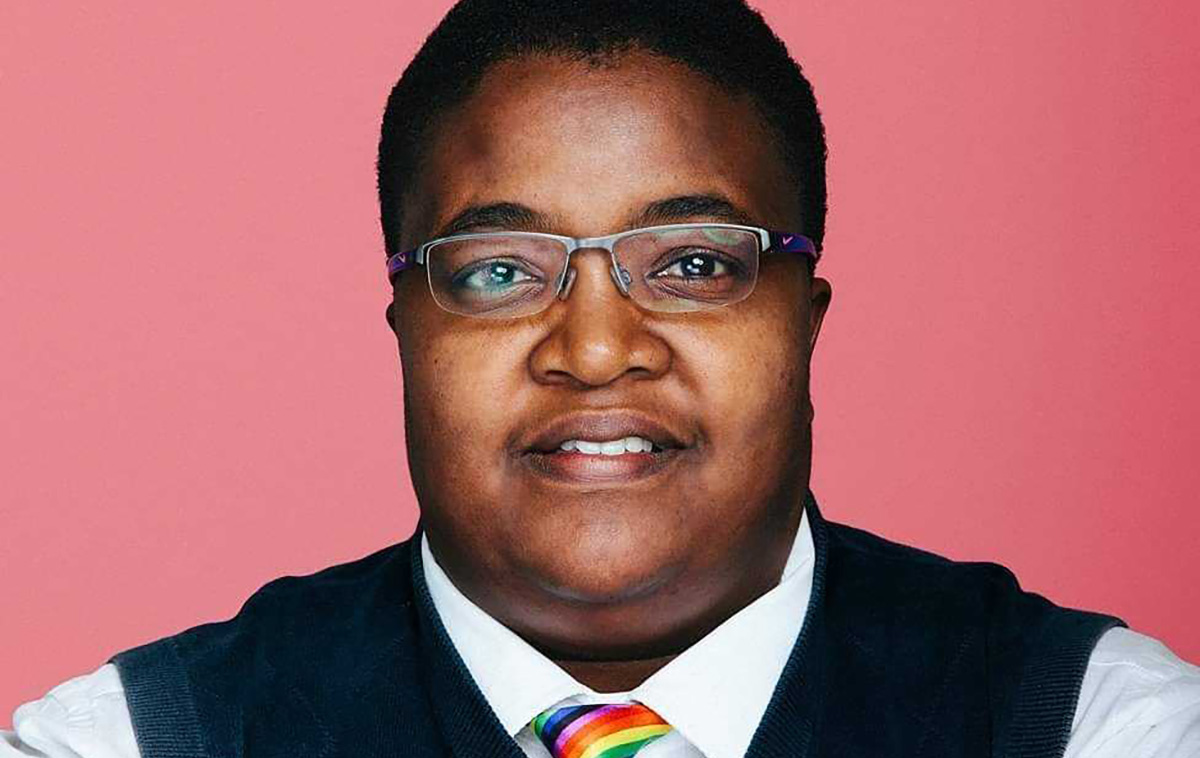
A prominent South African LGBTQ activist has won a seat in the country’s parliament.
Steve Letsike, a lesbian woman who founded Access Chapter 2, a South African advocacy group, is a member of the African National Congress. She is also part of the ANC’s National Executive Committee that determines the party’s direction.
Letsike won a seat in the South African National Assembly in national and provincial elections that took place on May 29.
The ANC lost its parliamentary majority that it had had since Nelson Mandela in 1994 won the South African presidency in the country’s first post-apartheid elections. MPs earlier this month re-elected President Cyril Ramaphosa after the ANC invited the Democratic Alliance and other parties to form a Government of National Unity.
Letsike in a statement to the Washington Blade described her election as “a milestone for the people of South Africa, and also affirmative of our party’s posture that is inclusive and intention to transformation agenda.”
“I am not in parliament for myself but the people that trusted the ANC to send individuals that will put people first,” said Letsike. “In that cohort that includes the LGBTI people like myself. Rooted in the teaching of a just society, that seeks equality and believes in the rule of law. That demand on developmental agenda from a queer lens and clear priorities of the people is important.”
“I am delighted by this task, trust and hope for our people,” she added.
Africa
Protesters vandalize Zimbabwean LGBTQ+ rights group’s offices
GALZ has reported the incident to the police

HARARE, Zimbabwe — A handful of protesters over this past weekend vandalized the offices of Zimbabwe’s largest LGBTQ+ rights organization.
Although they did not enter GALZ (an Association of LGBTI People in Zimbabwe)’s building in Harare, the country’s capital, they did gather at the gate and sang homophobic songs. The protesters also left anti-gay graffiti on the gate and walls.
Several people after the incident started to question the authenticity of the protesters, arguing GALZ itself organized the protest in order to get funding. They said some of the protesters “looked gay” and even argued the organization had yet to approach the police.
GALZ has sought to discredit some of the reports, while calling the protest disrespectful and uncalled for.
“We categorically condemn the acts of vandalism and intimidation that occurred on Sunday afternoon,” said GALZ in a statement. “A group of individuals claiming to represent various Christian churches descended at our offices. They proceeded to vandalize the property, painting hateful graffiti on the walls. While we respect differences in values, it is utterly unacceptable to deploy acts of vandalism and intimidation against communities who hold different values.”
GALZ said it has filed an official police report, and is “cooperating fully with the ongoing investigations.”
“We call on the authorities to hold the perpetrators accountable for these criminal actions,” said the organization.
GALZ also said it remains steadfast in its commitment to LGBTQ+ rights, and urged religious and political leaders to be at the forefront of fostering unity in Zimbabwe.
“This act of violence has not been committed in isolation, it is a stark reminder of the ongoing discrimination and hostility that our community faces,” said GALZ.
“We urge religious and political leaders to condemn such acts of hate and to uphold the constitutional rights and freedoms for all citizens to be protected by law regardless of their diverse backgrounds including sexual orientation, gender identity and expression. We encourage Zimbabweans to resort to open and respectful dialogue to address indifferences,” added the organization.
Several United Methodist Church parishioners last month held a protest in Harare during which they protested the church’s recent decision to allow LGBTQ+ clergy and same-sex marriages. James Kawadza, one of the protest organizers, said it was un-African to engage in same-sex relations.
“Homosexuality is unlawful in Zimbabwe and marriage is between a man and a woman,” he said. “The church has aligned with the rainbow movement, and this is also a threat to our African traditions and human existence at large. Homosexuality is not contextual, it is an abomination where Sodom and Gomorrah were destroyed by fire.”
Section 73 of Zimbabwe’s Criminal Law (Codification and Reform) Act on sexual crimes and crimes against morality says any “male person who, with the consent of another male person, knowingly performs with that other person anal sexual intercourse, or any act involving physical contact other than anal sexual intercourse that would be regarded by a reasonable person to be an indecent act, shall be guilty of sodomy and liable to” a fine, up to a year in prison or both.
Cases of people being arrested under this provision are rare.
Africa
What’s next for LGBTQ+ rights in South Africa after the country’s elections?
African National Congress lost parliamentary majority on May 29
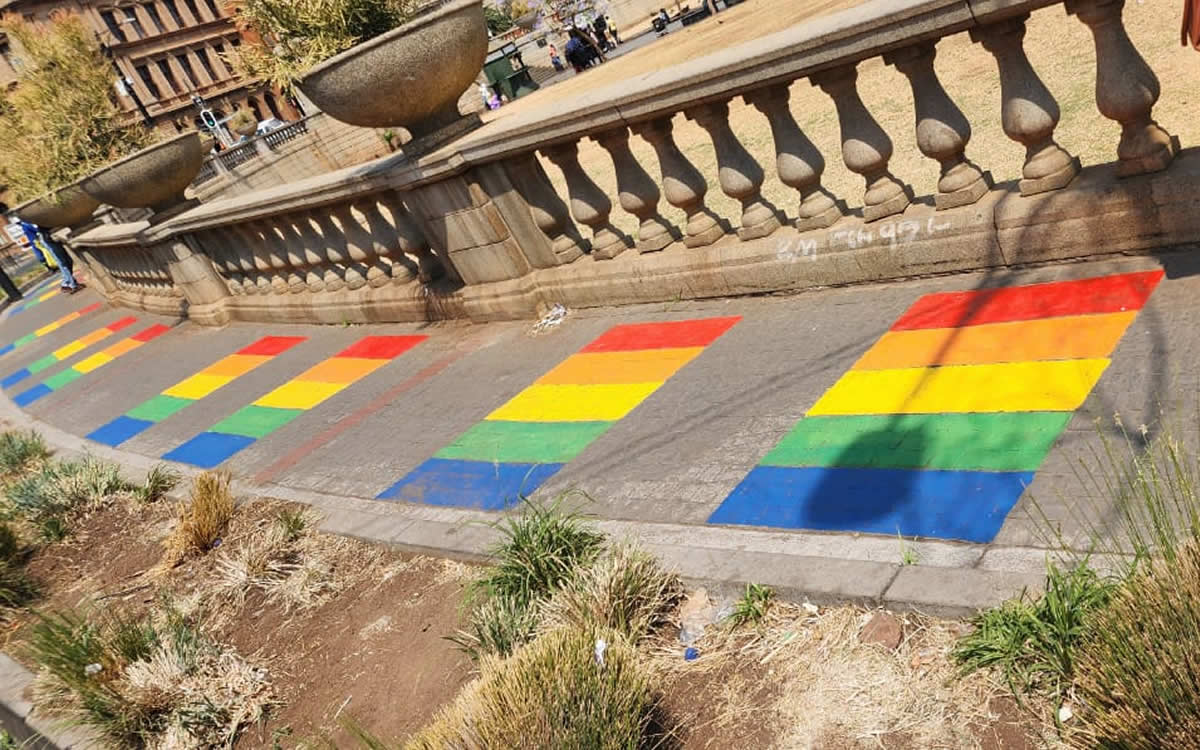
CAPE TOWN, South Africa — More than 50 independent candidates and political parties participated in South Africa’s national and provincial elections that took place on May 29. The Electoral Commission of South Africa declared the results on June 2.
No independent candidate or political party managed to secure the outright parliamentary majority of more than 50 percent of the votes, which prompts the creation of a coalition government. None of the 18 political parties that managed to win at least one seat in the National Assembly wholly represented the LGBTQ+ community.
Although South Africa is the only African country that constitutionally recognizes the rights of the LGBTQ+ community, some of the political parties that managed to secure seats in the National Assembly had signaled they would reserve these gains.
Former President Jacob Zuma, who leads the uMkhonto weSizwe (MK) party, during a January debate said the thought of dating within the same gender was unpalatable and un-African. The MK is now the country’s third largest political party after it won 14.58 percent of the vote, making it a pivotal player in the formation of a coalition government.
Dawie Nel, the executive director of OUT LGBT Well-being, said undermining the constitution is “a dangerous, misguided, and populist strategy to avoid acknowledging the failures of governance and the lack of implementation of constitutional values that are meant to improve the lives of South Africans.”
“South Africa’s constitution is celebrated as one of the most significant achievements of our transition to democracy, ensuring that all citizens are treated with dignity and respect, and that their rights are protected in all aspects of life,” said Nell.
There now seems to be an impasse on who becomes the government’s next leader because of some of the demands that political parties made before they entered into any negotiations.
Bruce Walker of Pretoria Pride said the best possible outcome for the preservation of LGBTQ+ rights in South Africa would be if the former governing political party, the African National Congress (ANC), which garnered the most support with 40.18 percent of the vote, partners with the Democratic Alliance (DA), which finished second with 21.81 percent of the votes, to form a coalition government.
“I think it will be a good outcome for the community if the DA has some power in a coalition government,” said Walker.
Rise Mzansi, which managed to secure 0.42 percent of the votes with two seats in the National Assembly, said it will continue protecting the rights of the LGBTQ+ community.
“Rise Mzansi reaffirms its commitment in protecting LGBTQ+ rights in South Africa, as outlined in Section 9 of our constitution,” said the party.
Zubenathi Daca, program coordinator for student employability and entrepreneurship development in Nelson Mandela University’s Department of Student Governance and Development said the fight for LGBTQ+ rights in South Africa will continue.
“The battle has not yet been won,” said Daca. “Queer people are still being killed and homophobic remarks are still being made towards us daily, and we need people who have found the confidence to voice out their dissatisfactions against how they are treated and also speak out for the voiceless.”
“This society is ours just as it is everyone else’s,” added Daca. “We are in corporate spaces, leadership positions, and political spaces to show that we belong here, and that we are here to stay.”
The constitution says National Assembly members should be sworn in within two weeks of the elections. They will then meet for the first time and elect a new speaker, deputy speaker and president.
Chief Justice Raymond Zondo who will preside over the entire process, on Monday said the National Assembly will meet for the first time since the elections on Friday.
Africa
LGBTQ+ Nigerians still struggle with housing discrimination and homelessness
Transphobia forced Fola Francis to flee her Ibadan home
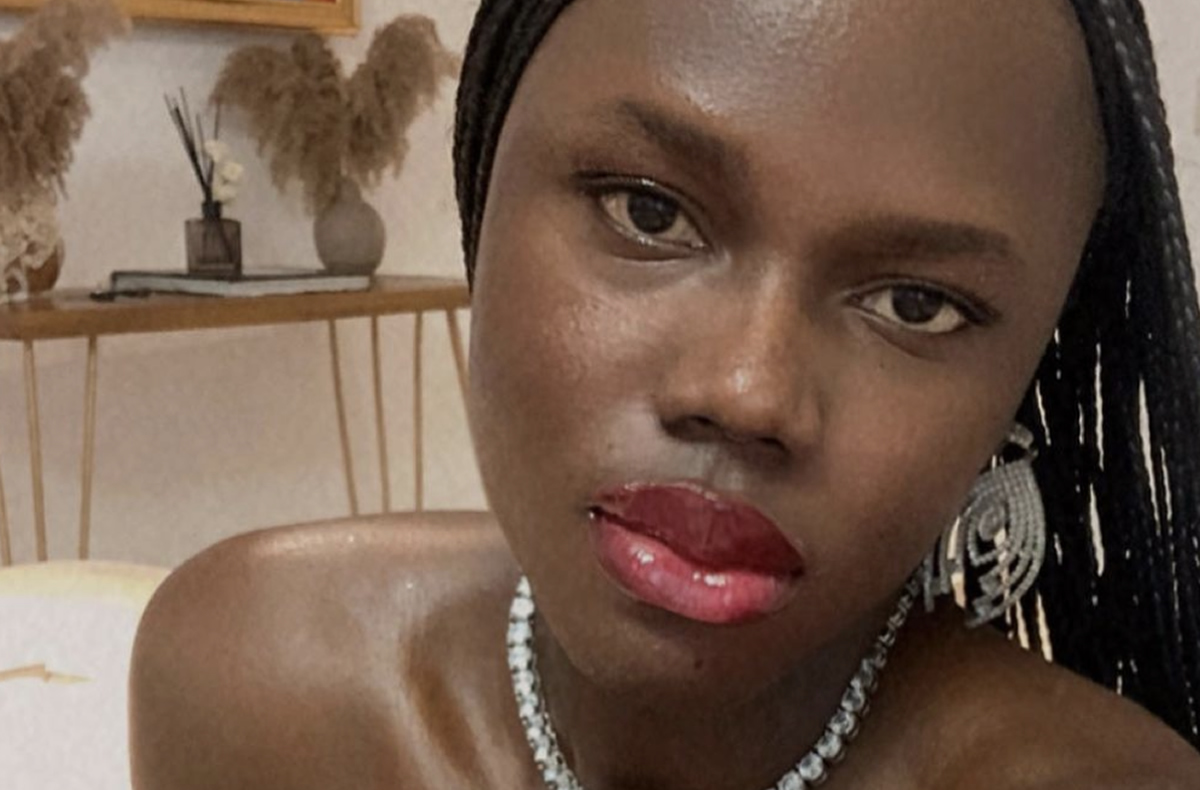
By Elvis Kachi | LAGOS, Nigeria — In Nigeria, the pursuit to secure a safe and comfortable home is often fraught with challenges for many, but for the LGBTQ+ community — especially those who are openly gay — these challenges are often insurmountable.
Some two years ago, Fola Francis, a popular transgender woman who has since passed away, had to leave her home in Ibadan and fled to Lagos due to transphobia. A now deleted video of her had gone viral on TikTok, and it got to the hands of her transphobic landlord and neighbors. They held a rally to make her leave the house, breaking into it many times.
“I got death threats from my neighbors due to them finding out I’m a trans woman on social media when my videos went viral,” she said to the BBC.
Francis’s experience doesn’t exist in isolation.
“For me, all I had to do was be visibly effeminate before my neighbors began to clamp down on and force me to move out,” Damian Okpara, a student at the University of Nigeria, told the Washington Blade.
Despite the global movement towards acceptance and equality, Nigerian society remains deeply rooted in conservative values that stigmatize and marginalize queer people; and this systemic discrimination is starkly evident in the housing sector, where visibly queer people face significant barriers and prejudices that deny them the fundamental right to safe and secure housing.
“It is nowhere in the constitution that a person should be discriminated against housing of their choice due to their sexuality,” Chizelu Emejuju, a human rights lawyer, told the Blade.
Emejuju founded Minority Watch, which is an organization that focuses on fighting for the rights of minorities, including the queer community, in Nigeria. That said, Nigeria’s legal framework is one of the most hostile in the world towards the LGBTQ+ community.
The Same-Sex Marriage (Prohibition) Act, passed in 2014, not only criminalizes same-sex relationships but also any public display of affection between same-sex couples. This law has legitimized widespread discrimination and has given rise to an environment where queer individuals are systematically marginalized and ostracized.
According to many, homosexuality is often viewed as a Western import, incompatible with the Nigerian values and traditions. Homophobia therefore translates into severe consequences for LGBTQ+ individuals, particularly in the realm of people.
For Okpara, he’s had to leave his former home to live with a friend, even though it may mean putting both of them at risk of homelessness.
“Although my friend’s place is more accepting of femme-boys like me, there is still the constant fear that they may switch up on us,” he said. “It’s so hard to be an effeminate man in Nigeria.”
Okpara’s experience is a stark reminder that for many LGBTQ+ Nigerians, the search for housing is a journey marked by rejection and prejudice. Landlords and housing agents frequently deny rentals to openly queer people or those they suspect are queer.
A common experience shared by many queer people is being evicted without notice once their sexual orientation or gender identity becomes known. Stories like that of Francis and Okpara are common — tenants, who after months of living peacefully, find themselves suddenly homeless, their belongings discarded, and their safety threatened. This precarious existence forces many into substandard living conditions, or in some cases, into homelessness.
The impact of housing discrimination on queer Nigerians is profound, extending far beyond the physical realm into deep psychological and emotional suffering.
“Although I am introverted and need friends, I have decided to not even bring anyone into my space anymore,” Valentina Ikpazu, an entrepreneur in Lagos, told the Blade. “At this point, I would rather find other ways to be happy than be homeless.”
The constant fear of eviction and the relentless search for a safe space create a state of perpetual anxiety and insecurity. This unstable housing situation often leads to chronic stress, depression, and other mental health issues.
The plight of LGBTQ+ people in Nigeria’s housing market exemplifies the broader struggles they face in a society that often rejects their very existence.
“Queer people need to understand that they have a legal right to stay in a place of choice, especially if the landowners do not include clauses that are discriminatory in the earlier stages of apartment acquisition,” Emejuju said. “Even if they include clauses that are outrightly discriminatory to queer people, it can be challenged in court, as there’s no law [backing up the clauses.]”
******************************************************************************************
Elvis Kachi is a Nigerian fashion and culture journalist. He’s had in pieces featured across platforms like BBC, Thomson Reuters, Essence Magazine, Condé Nast’s Them, etc. website: www.elviskachi.com
Africa
Kenyan Supreme Court orders MP to pay LGBTQ+ activist $5,000
Peter Kaluma challenged ruling that allowed NGO to register
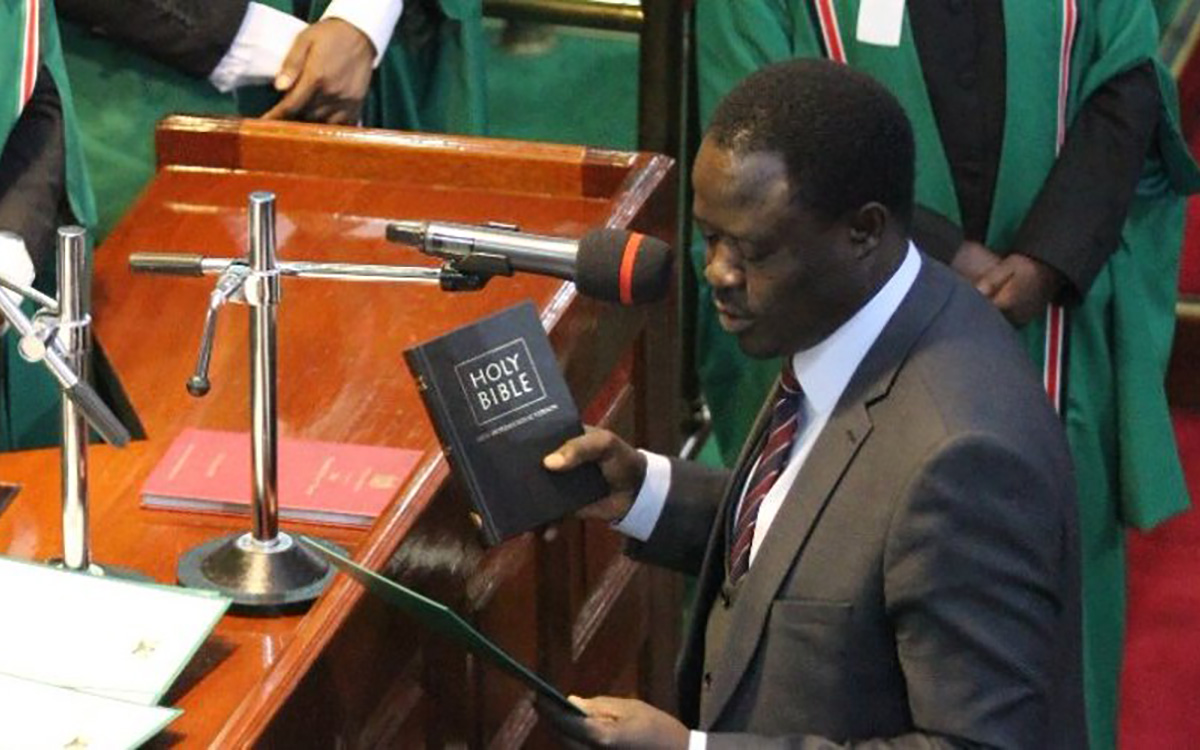
NAIROBI, Kenya — The Kenyan Supreme Court has ordered opposition MP Peter Kaluma to pay an LGBTQ+ activist around $5,000 (Ksh500,000) for challenging its ruling that allowed his former organization to register as a non-governmental organization.
The Supreme Court on Monday ordered Kaluma, who has sponsored the country’s anti-homosexuality bill, to pay former National Gay and Lesbian Human Rights Commission Executive Director Eric Gitari the amount after it dismissed his appeal of its ruling last September.
Gitari was a defendant in the case after leading the push for NGLHRC’s registration as an NGO amid opposition by the government because it championing consensual same-sex sexual relations that Kenya outlaws.
Five of the court’s seven justices, led by Deputy Chief Justice Philomena Mwilu through a virtual hearing, ordered the lawmaker to pay Gitari $5,000 for time wasted and costs incurred in hearing his appeal and an additional $2,000 (Ksh200,000) for bringing the case.
The judges’ ruling comes after Kaluma in January approached the Supreme Court to dispute the Deputy Registrar’s decision to assess the appeal’s costs and the order to pay Gitari after he lost.
The MP argued the Deputy Registrar did not serve him with the ruling’s notice to pay and that he only learned about the court’s decision when Gitari’s lawyer texted him to demand the $5,000.
Kaluma also argued the lawyer demanded that the court’s seven day timeline to challenge the payment had already expired on Nov. 14, 2023. Kaluma thus urged the Supreme Court to give him more time to challenge the Deputy Registrar’s decision.
The Supreme Court, however, rejected Kaluma’s plea after establishing he did not tell the truth since legal filings show the Deputy Registrar served him the ruling he disputed through his official email address on Nov. 6, 2023.
“We note that there have been numerous correspondences from the court through this court’s email address to MP Kaluma and vice versa. Notably, there was correspondence from the court on Sept. 12, 2023, and Nov. 6, 2023, to the MP via his email address,” Mwilu noted.
The judges also noted that from the court’s records from March 9, 2023, after issuing the first ruling in the NGLHRC registration case and emailing the same to Kaluma, do not indicate his email changed
“Therefore, there is no doubt in our minds that the email address in question belongs to the applicant. We therefore come to the irresistible conclusion that Kaluma was indeed aware and was served with the impugned ruling,” Mwilu stated.
The court further noted Kaluma did not provide a good reason for not challenging the Deputy Registrar’s decision within the statutory timelines.
“Further, the applicant has not met any of the conditions to convince this court to exercise its discretion in his favor,” Mwilu ruled.
Her affirmation on behalf of the court to decline to hear Kaluma’s attempt to delay paying Gitari brought the matter to an end. Kaluma is now required to comply with the order without any delay or risk further legal action.
Kaluma, who was not a party to the Supreme Court’s hearings in the NGLHRC case, lost his appeal last Sept. 12. The judges cited the MP’s filing his application beyond the stipulated timelines and for not being a party to the case during the initial hearings.
“In our view, the application is a disguised appeal from this court’s judgment and does not fall within the confines of the parameters prescribed for review by statute and applicable case law. Therefore, the application stands dismissed,” the court ruled. “On costs, the applicant is an advocate of the High Court of Kenya and a member of parliament. He ought to have known that his application was misconceived. He must consequently bear the costs thereof.”
The judges, while allowing NGLHRC to register as an NGO, stated it would be unconstitutional to limit the right to associate, through denial of registration of an association based on the applicants’ sexual orientation.
The Supreme Court’s ruling — which LGBTQ+ activists received with joy and anti-LGBTQ+ campaigners, clerics and politicians condemned — came 10 years later after Gitari challenged the Kenya NGOs Coordination Board in lower courts for refusing to register NGLHRC.
He brought the case in 2013.
Africa
South Sudan refugee camp is ‘not a safe haven’ for LGBTQ+ residents
Gorom Refugee Settlement is outside country’s capital of Juba

GOROM REFUGEE SETTLEMENT, South Sudan — LGBTQ+ people who live at a refugee camp in South Sudan say the mistreatment they are suffering because of their sexual orientation and gender identity has left them even more marginalized.
The U.N. Refugee Agency runs the Gorom Refugee Settlement, which is roughly 16 miles from Juba, the country’s capital, in partnership with ACROSS and other South Sudanese NGOs.
UNHCR says more than 20,000 refugees live at Gorom, with the Anyuak people from Ethiopia making up the largest group. They have been there since 2011 when South Sudan became its own country after it broke away from Sudan.
Although this is not the first time the plight of LGBTQ+ people has been raised; the challenges seem to continue unabatedly and grow worse as each year passes. They are denied employment opportunities, with some of their children unable to access education.
Yaga Piuson, an LGBTQ+ activist for Gorom, says the situation has become even more dire.
“The immediate challenges faced by LGBT persons within the camp are severe and pervasive,” said Piuson. “They endure daily attacks, lack of police assistance, death threats, stoning, abuses, discrimination, bullying, denial of medical care, and the inability for their children to access education. Many are also deprived of proper shelter, leading to health risks such as pneumonia.”
Piuson added UNHCR and ACROSS have done little to address these challenges, while the South Sudanese government has turned a blind eye.
“As of now, both the UNHCR and ACROSS have not provided a durable solution,” said Piuson. “While they have initiated interviews with LGBTQIA+ individuals, the options presented, relocation to other camps within South Sudan or urban areas, pose significant risks due to the country’s stance against homosexuality.”
“Unfortunately, the South Sudanese government and civic organizations have yet to offer any substantial assistance in alleviating these challenges,” added Piuson.
Piuson added some of the refugees have fled Gorom because of the continued persecution they face. Piuson said the settlement was no longer safe for LGBTQ+ refugees who include Anyuak, Darfurians from Sudan, Congolese and Burundians.
“Many of these nationalities have fled because of wars,” noted Piuson. “However, LGBTQIA+ individuals have fled solely due to persecution based on their sexual orientation.”
“Resolving the plight of LGBTQIA+ persons within the settlement requires providing them with a safe environment to freely exercise their rights, including freedom of movement and access to basic needs such as shelter and education for their children,” added Piuson. “It’s crucial to emphasize that the Gorom Refugee Settlement is currently not a safe haven for LGBTQIA+ individuals.”
ACROSS Executive Director Elisama Daniel in response to the Washington Blade’s request for comment said the organization did not have the mandate or jurisdiction to answer questions on the plight of LGBTQ+ people at Gorom, and directed questions to UNHCR. The agency did not respond to a request for comment.
Consensual same-sex sexual relations in South Sudan remain criminalized with up to 10 years in prison, although there is little to no evidence that anyone has been charged with homosexuality. The South Sudanese government, however, is contemplating an anti-homosexuality bill that is similar to those pending in neighboring Kenya and other countries.
Ugandan President Yoweri Museveni in May 2023 signed his country’s Anti-Homosexuality Act that prompted worldwide outrage.
South Sudanese Minister of Information, Communication, Technology and Postal Services Michael Makuei Leuth ahead of Pope Francis’s visit to the country last year said marriage is between a man and a woman and added any form of same-sex marriage violates the constitution. The government spokesperson also emphasizes there would not be any discussions around LGBTQ+-specific issues.
Africa
Kenyan advocacy group offers safety tips to LGBTQ+ hookup app users
Blackmail, kidnappings and assaults are commonplace

MOMBASA, Kenya — The growing cases of queer people in Africa becoming victims of blackmail, physical and sexual assault from online hook-ups have compelled a Kenyan LGBTQ+ rights group to work with the community to help it stay safe when using digital platforms.
Upinde Advocates for Inclusion held a 3-day training from May 11-14 to teach queer people about unsafe social media and dating app hook-up practices that suspected homophobes exploit.
The Mombasa-based group of which Lizzie Ngina is executive coordinator noted lesbian, bisexual and queer women, and gender non-conforming people are the most frequent targets online and on Grindr and other dating apps.
“LBQ women and GNC persons confront major challenges in terms of digital security and data protection, freedom of expression, assembly, association, speech, privacy, protest and online organizing,” Upinde Advocates for Inclusion stated.
Although the digital platforms were seen as convenient meet-up places for LGBTQ+ people in overcoming physical anti-gay attacks, Upinde Advocates for Inclusion said anti-gay discrimination, marginalization, gender-based violence, misinformation, and disinformation limits LGBTQ+ and gender non-conforming people from accessing the social media services.
Queer people while using dating apps and social media for hookups were, however, urged to first trust their intuition before deciding to have a physical meeting with people with whom they chat online.
“If it does not seem like someone you are messaging is using their true identity, they probably are not. In this case, do not agree to meet them in person,” Upinde Advocates for Inclusion warned.
It asked LGBTQ+ users to ensure the first in-person meeting with someone they met online is in a public place that is queer-friendly and known to them. Upinde Advocates for Inclusion also advised queer people to inform their trusted friends or family about their meeting plans, the place, and how long they expect it will take place in order to ensure someone can intervene if something goes wrong.
“Organize your own means of transport to and from the meeting, and do not accept a free ride from a stranger,” the group warned. “Also, do not move to a secondary location if you feel unsure during the meeting.”
Upinde Advocates for Inclusion also warned queer app users to remain sober during the meeting and cautioned against leaving their food or drinks unattended in order to avoid any potential risks associated with spiking.
The National Gay and Lesbian Human Rights Commission, Ishtar-MSM and other Kenyan LGBTQ+ advocacy groups that offer legal aid to queer people last year reported about 100 cases of blackmail, extortion, physical and sexual assault against their members by suspected homophobes they met on dating apps and social media.
The two organizations this month noted 10 of the cases are expected before courts soon, although they said most victims of anti-gay attacks don’t report them to the authorities because they fear further stigmatization and discrimination. Consensual same-sex sexual relations also remain criminalized in Kenya.
Targeting the LGBTQ+ community on digital platforms and dating apps is not unique to Kenya.
The Washington Blade last month reported it is still risky for queer Nigerians to search for a partner or to use gay dating apps infiltrated by homophobes who lure them to meet in-person and then rob or assault them. South African authorities last year arrested four men in connection with the targeting of Grindr users.
LGBTQ+ Kenyans urged to protect themselves at protests
Upinde Advocates for Inclusion in their workshop taught participants about the signs that suspected homophobes or their associates have compromised their devices. They include unusual activities on their cell phones that include calls with untraced history, disappearing blank messages, blinking screens, high data consumption, devices that overheat when not in use and echo when picking calls and quick battery depletion with minimal use.
“If you suspect your device is compromised, do not format or reset it, log out all the accounts, find an alternative device to use, change the password for the accounts on the device, and do not connect the gadget to any other devices,” Upinde Advocates for Inclusion warned.
The group also taught queer people about how they should conduct themselves when taking part in street protests amid anti-gay attacks. Upinde Advocates for Inclusion advised them to always to identify safe alternative routes to and from the protests, wear comfortable running shoes, and always carry a spare outfit that is not LGBTQ+-specific.
“If you are in a group, always strategize on having a meeting point should there be any danger or should you get separated,” the group stated. “Also, try to split up responsibilities among the group so that one person can’t be targeted.”
Upinde Advocates for Inclusion also urged queer people to always leave a protest before it ends, to have an emergency contact on speed dial or memorize it for immediate help in case of danger and to always to keep in touch with a trusted contact who is familiar with the protest but not attending it.
Africa
Uganda’s president meets with US ambassador
Unclear whether William Popp raised Anti-Homosexuality Act

Editor’s note: This article has been updated.
ENTEBBE, Uganda — Ugandan President Yoweri Museveni on May 10 met with U.S. Ambassador to Uganda William Popp.
Museveni in a post to his X account described the meeting, which took place at his official residence in Entebbe, as “productive.”
“We discussed key issues, such as the upcoming Census, regional peace, and socio-economic development. I emphasized the need for an inclusive census for informed decision-making,” said Museveni. “I also shared my views on fostering peace and security in the region. Additionally, we discussed opportunities in transitioning our population from a rural-based pre-capitalist society to industry and services.”
I had a productive meeting with the US Ambassador to Uganda, H.E William Popp, at State House Entebbe. We discussed key issues such as the upcoming census, regional peace, and socio-economic development. I emphasized the need for an inclusive census for informed decision-making.… pic.twitter.com/yHRZPHEltZ
— Yoweri K Museveni (@KagutaMuseveni) May 9, 2024
A statement the Ugandan Foreign Affairs Ministry released noted Popp “conveyed his appreciation for the president’s valuable time and wise counsel.”
“He also acknowledged President Museveni’s extensive knowledge and experience, underscoring the importance of their continued dialogue in fostering a strong and mutually beneficial relationship between the United States and Uganda,” said the statement.
The statement further notes Foreign Affairs Minister Jele Odongo; Defense and Veterans Affairs Minister Jacob Oboth-Oboth; Rosette Byengoma of the Defense Ministry; and Lt. Gen. Samuel Okiding, who is deputy chief of the Ugandan defense forces, attended the meeting.
The meeting took place nearly a year after Museveni signed the Anti-Homosexuality Act that, among other things, contains a death penalty provision for “aggravated homosexuality.”
The U.S. has sanctioned Ugandan officials and removed the country from a duty-free trade program. The World Bank Group also suspended new loans to Uganda in response to the Anti-Homosexuality Act.
The Ugandan Constitutional Court last month refused to “nullify the Anti-Homosexuality Act in its totality.” A group of Ugandan LGBTQ+ activists have appealed the ruling.
It is not clear whether Popp raised the Anti-Homosexuality Act with Museveni during their meeting.
“We do not discuss the details of private diplomatic engagements; however, we have regularly raised with the highest levels of Ugandan government U.S. government concerns about democratic space, rule of law, and respect for human rights for all Ugandans, including members of the LGBTQI+ community in relation to the 2023 Anti-Homosexuality Act,” a State Department spokesperson told the Washington Blade on Wednesday.
Africa
South African president signs hate crimes, hate speech law
Advocates largely welcome new statute
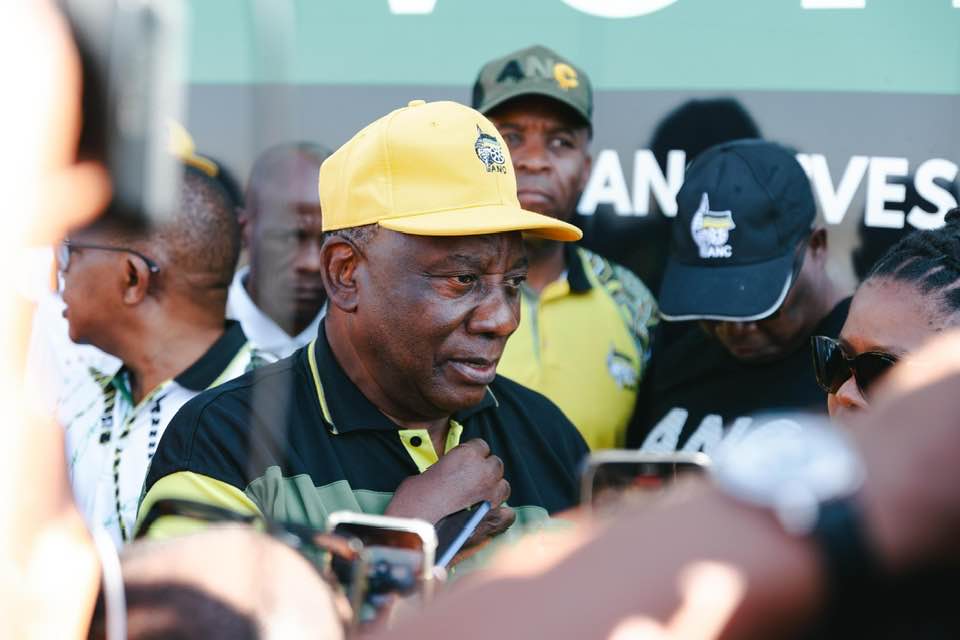
PRETORIA, South Africa — South African LGBTQ+ organizations have welcomed a new law that seeks to combat hate crimes and hate speech.
President Cyril Ramaphosa on May 9 signed the Preventing and Combating of Hate Crimes and Hate Speech Bill that had been introduced in 2018.
According to the new law; the direct or indirect unfair discrimination against anyone on the grounds of age, albinism, culture, disability, ethnic or social origin, gender, HIV status, language, nationality, migrant, refugee status, asylum seekers, occupation, trade, political affiliation, conviction, race, religion, sex, sexual orientation, gender identity or expression, sex characteristics or skin color is a criminal offense punishable by a fine or up to eight years in prison.
“A hate crime is committed if a person commits any recognized offense under any law that is motivated by prejudice or intolerance based on one or more characteristics or perceived characteristics of the victim, as listed in the legislation or a family member of the victim,” said the president’s office. “The law also makes it an offense when speech material is intentionally distributed or made available in electronic communication, and the said person knows that such electronic communication constitutes hate speech.”
Crimen injuria, the unlawful and intentional impairing of dignity or privacy of another person under common law, was in place before the new law. Crimen injuria, which to extent protected some forms of hate against the LGBTQ+ community, is still active.
The Preventing and Combating of Hate Crimes and Hate Speech Bill, however, is more comprehensive in the sense that it particularly focuses on hate speech and hate crimes, and therefore makes it easier to seek legal recourse than under crimen injuria.
“As Out, we commend President Cyril Ramaphosa on the move that he has made in making sure that the rights of LGBTQ+ persons are protected. We, as Out, also hope that other African countries can learn from this historic milestone that all people are equal and that their rights should be protected,” said Out LGBT South Rights Human Rights Coordinator Sibonelo Ncanana.
Ncanana specifically applauded Deputy Justice and Constitutional Development Minister John Jeffrey and the working group that helped secure the bill’s passage.
“We hope that all government departments will enforce the mandate of the act,” said Ncanana. “We also hope that it will help in decreasing the amount of hate crimes that are happening in South Africa, create safer communities, and that LGBTQ+ people will find themselves safe.”
Ruth Maseko of Umndeni LGBTI Group and the Triangle Project said the new law creates a precedent of what constitutes hate crime and the repercussions.
“We are delighted at the passing of the bill after so many years, as it creates a legal definition of hate crimes,” said Maseko. “This now puts in place mechanisms for authorities to collect and report details about these incidents of hate for the effective monitoring, analysis of trends, and appropriate interventions that are needed.”
Maseko added that although the new law will aid in giving the courts a framework to work in when handling cases of hate, it will not really deter people from committing those crimes.
“The new law will provide quantitative and qualitative data as currently we have no way of telling how many of these crimes are committed. The only way we know, is when they are reported to a civil society organization or are reported in the media,” said Maseko.
“Although it will do nothing to change the attitudes of people who act out in these ways, the law does send out a message that hate crimes will not be tolerated in South Africa and will provide additional tools to investigators and prosecutors to hold perpetrators accountable for their actions,” added Maseko.
The law, however, does not consider actions undertaken in good faith as part of hate speech. They include artistic creativity, performance or other form of expression, academic or scientific inquiry fair, and accurate reporting or commentary in the public interest.
It also excludes interpretation and articulating or espousing of any religious conviction, tenet, belief, teaching, doctrine or writing that does not advocate hatred or constitutes incitement to cause harm. The law also contains directives on training and other measures to be undertaken by the South African Police Service and the National Prosecuting Authority to ensure effective processing of the newly defined crimes.
-
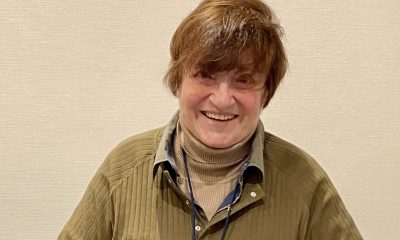
 Arts & Entertainment2 days ago
Arts & Entertainment2 days agoLesbian comic/activist Robin Tyler gets a long overdue ‘Outstanding’ Netflix spotlight
-
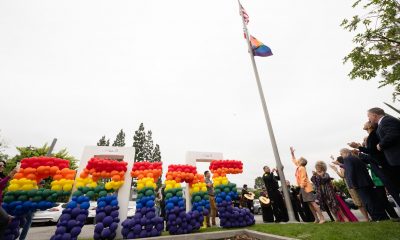
 Los Angeles County4 days ago
Los Angeles County4 days agoDowney official who banned Pride flag elected to lead influential national Latino political group
-
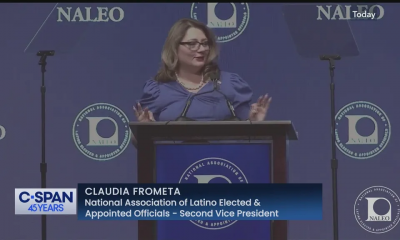
 Los Angeles County2 days ago
Los Angeles County2 days agoHONOR PAC launches petition to oust NALEO’s new president over Pride flag vote
-
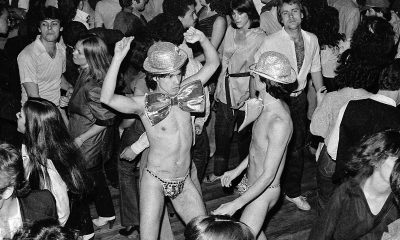
 Television4 days ago
Television4 days agoPBS ‘Disco’ is a Pride party you don’t want to miss
-

 Arts & Entertainment5 days ago
Arts & Entertainment5 days agoNetflix’s ‘Outstanding’ Documentary Reveals Queer Comedy Icons’ Impact on LGBTQ+ Rights
-
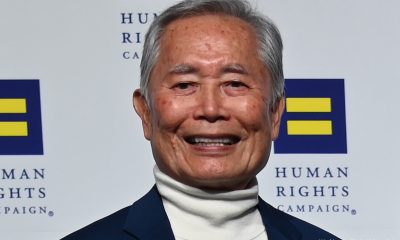
 History4 days ago
History4 days agoLGBTQ+ History Archive Gains Momentum: Personal Stories Project Partners with George Takei
-

 a&e features4 days ago
a&e features4 days agoGMCLA’s ‘Solid Gold’ Gala: Honoring LGBTQ+ Champions with Iconic Diva Tributes
-

 Africa5 days ago
Africa5 days agoProminent South African activist elected to country’s parliament
-

 European Union3 days ago
European Union3 days agoGay US ambassador to Hungary marches in Budapest Pride parade
-

 Autos4 days ago
Autos4 days agoAll charged up: BMW i7 xDrive6



